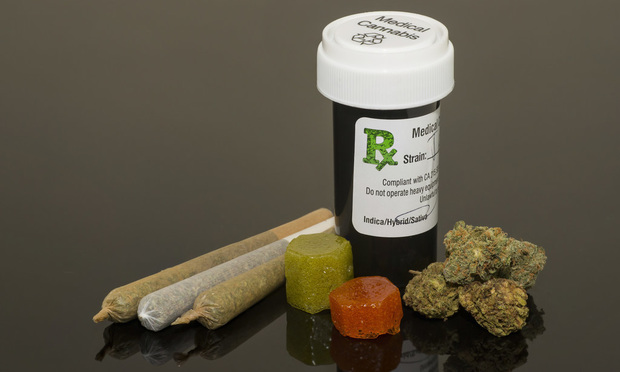Medical Marijuana Covered by Workers Compensation Act
COURT WATCH: Recent decision permits a Workers Compensation judge to award medical marijuana expenses to a person duly qualified by a doctor, to receive marijuana to treat work-related injuries.
March 26, 2020 at 10:00 AM
5 minute read
 Photo by Thom Morris.
Photo by Thom Morris.
Should an employer be required to reimburse an employee for the cost of medical marijuana treatments as a result of a work related injury? On Jan. 13, 2020, the court answered this question in the affirmative. Hager v. M & R Construction, 2020 WL 218390 (App. Div.).
While working at a construction site in 2001, a concrete delivery truck dumped its load on petitioner. As a result, at age 28, he sustained a large L5-S1 herniated disc and an L4-L5 annular bulge.
Over the next 15 years, in an effort to relieve his constant back pain, petitioner received treatments from a chiropractor, a physical therapist, two neurosurgeons, a spinal surgeon, a pain management doctor, and a hospice and palliative care doctor. His operative procedures included a laminectomy and decompression of several nerve roots, as well as a two-level lumbar fusion.
When these surgeries and conservative treatments failed to relieve him of his continued pain, petitioner's doctors prescribed opioids, including oxycontin, oxycodone, valium, and lyrica, to which he became addicted. In order to come off the opioids, his doctor qualified him for and prescribed medical marijuana, which finally provided him with some relief. His doctor opined that, in order to manage his pain, petitioner would need to receive the marijuana, which is less physically addictive than opioids, for the rest of his life.
Respondent appealed the Workers Compensation judge's decision requiring respondent to reimburse petitioner for his future out of pocket medical marijuana costs ($616 per month).
Appellate Division Judge Currier, in affirming the Workers Compensation award, held that, contrary to respondent's contention, requiring the employer to reimburse petitioner these costs did not violate the Federal Controlled Substances Act (21 U.S.C. 841) because the employer would not be possessing, manufacturing, or distributing the marijuana but only reimbursing the cost to petitioner. Additionally, the court pointed out that respondent produced no evidence of an intention by the federal government to enforce the Controlled Substances Act "in any state that has decriminalized medical marijuana."
Finally, Judge Currier astutely noted that petitioner's use of medical marijuana has permitted him to get off opioids and "that achievement, by itself, in light of the opioid crisis in existence today, should suffice as a rationale for the reimbursement of medical marijuana."
Although Judge Currier correctly noted that this was an issue of first impression at the appellate level, it was not the first time this issue was raised in New Jersey. Indeed, Workers Compensation Judge Lionel Simon, on June 28, 2018, based on different facts, made a similar ruling, in an unpublished oral decision, McNeary v. Freehold Township. At that time, this author predicted that, at some time in the future, a higher court would provide judicial guidance as to whether, in some cases, medical marijuana may have therapeutic usefulness. (See this author's op. ed. article in the Sept. 24, 2018, issue of the New Jersey Law Journal.) Well, it took only 18 months for Judge Currier to provide that guidance.
Next prediction? That this avant-garde decision, which permits a Workers Compensation judge to award medical marijuana expenses to a person duly qualified by a doctor, to receive marijuana to treat work-related injuries, will be a jumping off point for further development of this timely issue.
Specifically, assume scenario #1: a plaintiff in an automobile accident sustains a severe disabling injury for which he receives extensive customary treatment by various medical disciplines, including chiropractic, physical therapy, acupuncture, several surgeries, pain management, opioids and, eventually, because this treatment is unsuccessful, resorts to medically approved marijuana to relieve the pain. Assume further, that the cost of this extensive treatment exhausts his or her $250,000 personal injury protection benefits. Therefore, any uncompensated reasonable and necessary medical expenses, should be recoverable by plaintiff from the tortfeasor. N.J.S.A. 39:6A-12. (See dissent of Justice Albin in Haines v. Taft, 237 N.J. 271 (2019).) In such a case, in this author's opinion, those medical marijuana expenses should be boardable and subject to a jury awarding them to plaintiff and against the tortfeasor.
Scenario #2: assume the same medical facts as scenario #1, but plaintiff sustains his or her injury as a result of a slip and fall on black ice or in the produce isle of a supermarket. Should not all medical expenses, including medical marijuana expenses, be boardable and awardable by a jury to plaintiff and against the culpable defendant?
If a Workers Compensation judge is now allowed, pursuant to Judge Currier's decision, to award a petitioner medical marijuana expenses, why shouldn't a jury be permitted to award such expenses to an injured plaintiff and against a tortfeasor? I submit that to ask the question is to answer it.
Fodder for a future article in this column?
Stay tuned.
Louis Locascio, a Monmouth County Superior Court judge from 1992 until 2009, is now of counsel with the Red Bank office of Gold, Albanese, Barletti & Locascio, where he heads up their civil and family mediation/arbitration department. He is a certified civil and criminal trial lawyer.
This content has been archived. It is available through our partners, LexisNexis® and Bloomberg Law.
To view this content, please continue to their sites.
Not a Lexis Subscriber?
Subscribe Now
Not a Bloomberg Law Subscriber?
Subscribe Now
NOT FOR REPRINT
© 2025 ALM Global, LLC, All Rights Reserved. Request academic re-use from www.copyright.com. All other uses, submit a request to [email protected]. For more information visit Asset & Logo Licensing.
You Might Like
View All
Law Firms Look to Gen Z for AI Skills, as 'Data Becomes the Oil of Legal'



Trending Stories
- 1Uber Files RICO Suit Against Plaintiff-Side Firms Alleging Fraudulent Injury Claims
- 2The Law Firm Disrupted: Scrutinizing the Elephant More Than the Mouse
- 3Inherent Diminished Value Damages Unavailable to 3rd-Party Claimants, Court Says
- 4Pa. Defense Firm Sued by Client Over Ex-Eagles Player's $43.5M Med Mal Win
- 5Losses Mount at Morris Manning, but Departing Ex-Chair Stays Bullish About His Old Firm's Future
Who Got The Work
J. Brugh Lower of Gibbons has entered an appearance for industrial equipment supplier Devco Corporation in a pending trademark infringement lawsuit. The suit, accusing the defendant of selling knock-off Graco products, was filed Dec. 18 in New Jersey District Court by Rivkin Radler on behalf of Graco Inc. and Graco Minnesota. The case, assigned to U.S. District Judge Zahid N. Quraishi, is 3:24-cv-11294, Graco Inc. et al v. Devco Corporation.
Who Got The Work
Rebecca Maller-Stein and Kent A. Yalowitz of Arnold & Porter Kaye Scholer have entered their appearances for Hanaco Venture Capital and its executives, Lior Prosor and David Frankel, in a pending securities lawsuit. The action, filed on Dec. 24 in New York Southern District Court by Zell, Aron & Co. on behalf of Goldeneye Advisors, accuses the defendants of negligently and fraudulently managing the plaintiff's $1 million investment. The case, assigned to U.S. District Judge Vernon S. Broderick, is 1:24-cv-09918, Goldeneye Advisors, LLC v. Hanaco Venture Capital, Ltd. et al.
Who Got The Work
Attorneys from A&O Shearman has stepped in as defense counsel for Toronto-Dominion Bank and other defendants in a pending securities class action. The suit, filed Dec. 11 in New York Southern District Court by Bleichmar Fonti & Auld, accuses the defendants of concealing the bank's 'pervasive' deficiencies in regards to its compliance with the Bank Secrecy Act and the quality of its anti-money laundering controls. The case, assigned to U.S. District Judge Arun Subramanian, is 1:24-cv-09445, Gonzalez v. The Toronto-Dominion Bank et al.
Who Got The Work
Crown Castle International, a Pennsylvania company providing shared communications infrastructure, has turned to Luke D. Wolf of Gordon Rees Scully Mansukhani to fend off a pending breach-of-contract lawsuit. The court action, filed Nov. 25 in Michigan Eastern District Court by Hooper Hathaway PC on behalf of The Town Residences LLC, accuses Crown Castle of failing to transfer approximately $30,000 in utility payments from T-Mobile in breach of a roof-top lease and assignment agreement. The case, assigned to U.S. District Judge Susan K. Declercq, is 2:24-cv-13131, The Town Residences LLC v. T-Mobile US, Inc. et al.
Who Got The Work
Wilfred P. Coronato and Daniel M. Schwartz of McCarter & English have stepped in as defense counsel to Electrolux Home Products Inc. in a pending product liability lawsuit. The court action, filed Nov. 26 in New York Eastern District Court by Poulos Lopiccolo PC and Nagel Rice LLP on behalf of David Stern, alleges that the defendant's refrigerators’ drawers and shelving repeatedly break and fall apart within months after purchase. The case, assigned to U.S. District Judge Joan M. Azrack, is 2:24-cv-08204, Stern v. Electrolux Home Products, Inc.
Featured Firms
Law Offices of Gary Martin Hays & Associates, P.C.
(470) 294-1674
Law Offices of Mark E. Salomone
(857) 444-6468
Smith & Hassler
(713) 739-1250






